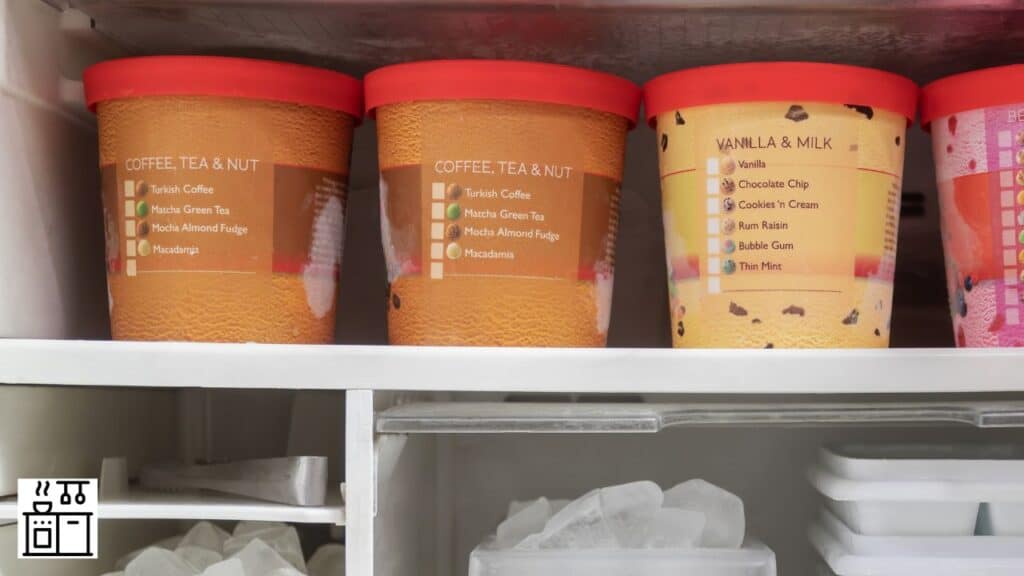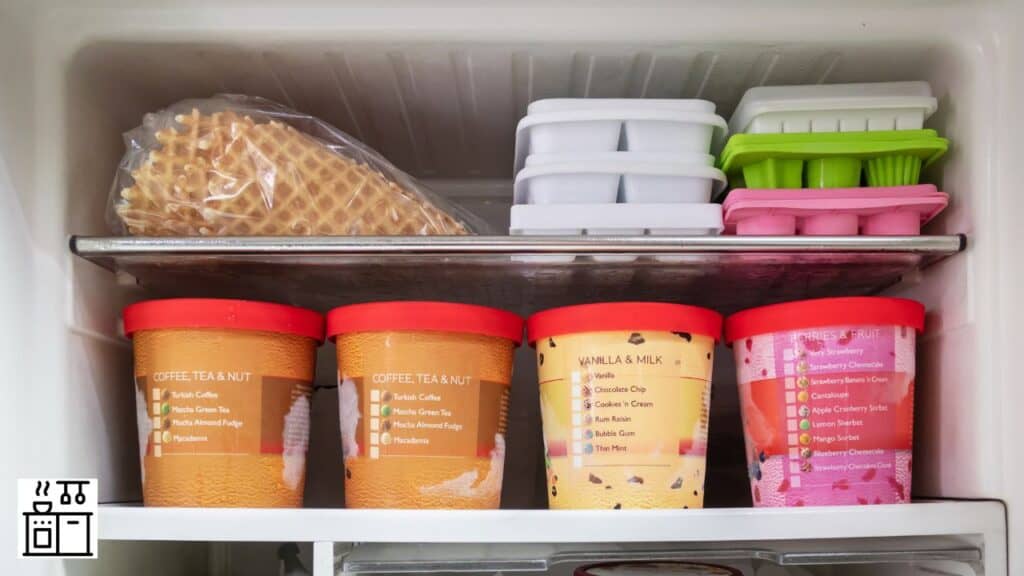A freezer might not freeze ice cream effectively due to several reasons, such as poor air circulation, wrong temperature settings, or faulty parts. The freezing process of ice cream is also influenced by its lower density compared to other frozen foods, the sugar’s role in reducing the freezing point, and its fat content.
Let’s now discuss these reasons in detail and ways to fix this problem.
What Causes a Freezer to Not Freeze the Ice Cream Properly?
If your freezer isn’t freezing your ice cream correctly, the primary reasons are:
- Poor air circulation,
- The freezer is too empty or too full,
- Improper temperature settings, and
- Malfunctioning components.
1. Poor Air Circulation
Poor air circulation is often the reason your freezer doesn’t freeze the ice cream correctly.
This condition can cause uneven cooling, preventing the ice cream from freezing uniformly.
Overcrowding in your freezer can obstruct airflow, resulting in some parts being colder than others, leading to semi-frozen or melted ice cream.
Frozen vents can further impede proper air circulation. If your freezer’s vents are blocked by ice buildup, the cold air circulation is affected.
Regular defrosting of your freezer and unblocking vents is recommended for optimal freezing conditions. This ensures your ice cream and other frozen desserts are stored correctly and ready for consumption.
2. Freezer Is Too Empty or Too Full
Don’t think that a barely filled or overly packed freezer is good for your frozen foods.
If your freezer is too empty, it can cause temperature changes because more space increases airflow each time you open the door. This inconsistency can affect your ice cream.
Also, don’t fill your freezer to the top. A too-full freezer blocks airflow, which stops your freezer from cooling correctly. This can make your ice cream as if it were left out on the kitchen counter.
Find a balance. Fill your freezer enough to keep a steady temperature, but leave room for air to move around. This way, your ice cream will freeze properly and be ready when you want to eat it.
3. Incorrect Temperature Settings
Regularly check the temperature settings of your freezer. Incorrect settings may cause your ice cream to not freeze adequately, resulting in a liquidy dessert.
Your freezer temperature should be sufficiently low to freeze the ice cream effectively. If not, your ice cream won’t harden as desired.
The recommended temperature for freezing ice cream is approximately -18°C (0°F).
If the temperature is above this, your ice cream may not freeze fully. On the other hand, a temperature too low can cause freezer burn. So try to maintain a balanced temperature.
4. Malfunctioning Components
If your freezer isn’t freezing your ice cream, malfunctioning components could be the cause.
Defective components such as the thermostat or compressor can interfere with your freezer’s cooling function.
The thermostat controls temperature, and if it malfunctions, it can lead to improper cooling. The compressor is essential to your freezer’s cooling system, and if it fails, it can result in no freezing.
Components like the door seal, evaporator fan, and start relay also play a vital role in temperature regulation. If any of these components are defective, your freezer may not perform efficiently.
How Do the Properties of Ice Cream Affect Its Freezing?
Ice cream doesn’t freeze as solidly as other foods in your freezer due to its lower density.
Moreover, sugar in ice cream reduces its freezing point, and the amount of fat influences the speed at which it freezes.
Ice Cream’s Lower Density Compared to Other Frozen Foods
Ice cream is less dense than other frozen foods, which affects the way it freezes. It takes up more space per weight, leading to a slower freezing rate. This is why your ice cream may not seem as solid as other frozen items.
This is not due to your freezer’s efficiency but due to ice cream’s unique properties.
So allow more freeze time for your ice cream or adjust your freezer’s settings to suit its lower density.
The Role of Sugar in Lowering the Freezing Point of Ice Cream
Sugar significantly contributes to lowering the freezing point of ice cream, making it stay soft in cold conditions.
The sugar in ice cream isn’t merely for sweetness; it also scientifically alters the freezing point of water. This means ice cream doesn’t become as hard as ice at zero degrees.
The specific freezing point depends on the sugar concentration – the more the sugar, the lower the freezing point. So, if your ice cream isn’t freezing properly, the sugar content could be the reason.
Fat Content and Its Impact on Freezing
Fat content significantly impacts the texture, melt rate, and shelf life of your dessert, particularly ice cream.
Ice cream with high-fat content tends to be smoother and melts slower. Conversely, low-fat content can result in a rougher texture and faster-melting ice cream.
Fat globules in the mixture can increase the shelf life by preventing ice crystal growth and slowing recrystallization. So if your freezer isn’t solidifying your ice cream adequately, the fat content could be a potential reason.
What Are the Common Freezer Issues that Can Affect Ice Cream Freezing?

If your ice cream is not freezing properly, there could be some common problems with your freezer.
These issues can include loose or damaged door seals, dirty or clogged condenser coils, frost buildup in the freezer, or a faulty evaporator fan.
Understanding these problems can help you figure out what’s wrong with your freezer.
Loose or Damaged Door Seals
Inspect your freezer’s door seals if your ice cream isn’t freezing correctly. Loose or damaged seals could be the problem.
Faulty door seals can let cool air out and warm air in, disrupting the freezer’s temperature. This can stop your ice cream from freezing properly.
Regularly check the seals for any signs of wear or damage. Replace them if they are loose or cracked. This will help maintain the correct temperature in the freezer, ensuring your ice cream and other items freeze correctly.
Dirty or Clogged Condenser Coils
Condenser coils, when dirty, struggle to release the heat efficiently. This inefficiency can affect your freezer’s ability to maintain the necessary freezing temperature.
Regular cleaning of your condenser coils can mitigate this issue. This task requires a coil brush and a vacuum and is quite straightforward.
Nonetheless, if you’re not comfortable handling it, you can hire a professional.
Frost Buildup in The Freezer
If there is too much frost on the evaporator coils, the cooling may be uneven. This could cause your ice cream to not freeze properly.
If frost builds up too much, the freezer may struggle to keep the right temperature.
This means your ice cream might not get as hard as it should.
Check for frost buildup regularly and defrost your freezer when needed. This helps your freezer work at its best and ensures your ice cream freezes perfectly.
Malfunctioning Evaporator Fan
A malfunctioning evaporator fan can lead to inadequate air circulation. This fan is essential for spreading cold air throughout your freezer.
If it stops working, the temperature may increase, resulting in your ice cream melting.
An abnormal noise, such as a rattle or buzz, could indicate a fan malfunction. If you hear this, contact a professional.
Neglecting a faulty fan can not only prevent your ice cream from freezing but may also thaw other items in your freezer, causing food spoilage.
How Can You Troubleshoot and Fix a Freezer That’s Not Freezing Ice Cream?
If your ice cream isn’t freezing, you can try and fix the freezer yourself.
Here are some ways to do it.
Check and Adjust the Temperature Settings
Make sure your freezer’s temperature settings are accurate to properly freeze your ice cream. Incorrect settings can result in improperly frozen ice cream.
Your freezer’s temperature should be about 0°F (-18°C). If it’s higher, your freezer is not cold enough, so your ice cream may not freeze correctly. Use a freezer thermometer for an accurate reading.
If necessary, adjust the settings. Note that it could take up to 24 hours for changes to take effect. Wait for a day and then check the temperature again.
Rearrange Items in The Freezer for Better Air Circulation
Reorganize your freezer items to enhance air circulation. A crowded freezer can hinder airflow, affecting the freezing of your ice cream.
Here’s what you need to do: make sure there’s sufficient space between items for the cold air to move freely. Also, ensure that the evaporator fan is unblocked. This helps maintain the freezer’s temperature.
The organization of your freezer impacts its performance significantly. So, declutter and place your items strategically to avoid blocking the airflow.
Inspect and Replace Door Seals if Necessary
Inspect your freezer’s door seals for wear or damage. Damaged seals allow cool air to escape and warm air to enter, causing your freezer to perform poorly.
Look for cracks, tears, or loose areas. If you find any, replace the seals immediately.
Clean Condenser Coils
To enhance your freezer’s efficiency, clean the condenser coils. Dirty coils can reduce the freezer’s effectiveness, making it difficult to maintain the ideal temperature for freezing items like ice cream.
First, unplug your freezer to ensure safety. Then, locate the coils, which are usually found at the back or bottom of the freezer. Use a coil brush or vacuum to remove dust and debris. Be careful not to damage the coils.
After cleaning, reconnect the freezer and wait for it to reach the appropriate temperature.
Remove Obstructions from The Evaporator Fan
The evaporator fan in your freezer needs to be clear of blockages for proper air circulation. If the fan is blocked, your freezer may not cool effectively.
So inspect the fan regularly and remove any blockages immediately. These can be dust, ice, or misplaced food items.
Consult a Profesional
If the steps you’ve taken don’t work, consider getting help from a professional.
It’s okay to admit if the problem is too complex. Trying to fix a serious issue on your own could cause more damage to your freezer, which could be more costly.
A skilled technician can identify the problem and find the right solution. They can fix your freezer, give advice on how to keep it working well and make your ice cream freeze properly.

